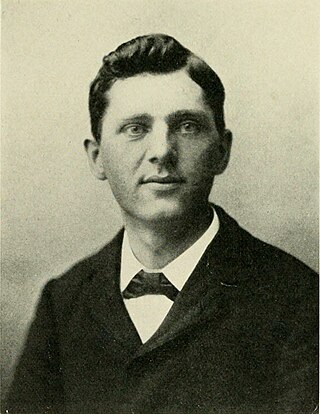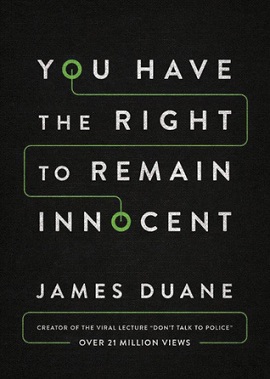Related Research Articles

In the United States, the Miranda warning is a type of notification customarily given by police to criminal suspects in police custody advising them of their right to silence and, in effect, protection from self-incrimination; that is, their right to refuse to answer questions or provide information to law enforcement or other officials. Named for the U.S. Supreme Court's 1966 decision Miranda v. Arizona, these rights are often referred to as Miranda rights. The purpose of such notification is to preserve the admissibility of their statements made during custodial interrogation in later criminal proceedings. The idea came from law professor Yale Kamisar, who subsequently was dubbed "the father of Miranda."

Bruce Schneier is an American cryptographer, computer security professional, privacy specialist, and writer. Schneier is an Adjunct Lecturer in Public Policy at the Harvard Kennedy School and a Fellow at the Berkman Klein Center for Internet & Society as of November, 2013. He is a board member of the Electronic Frontier Foundation, Access Now, and The Tor Project; and an advisory board member of Electronic Privacy Information Center and VerifiedVoting.org. He is the author of several books on general security topics, computer security and cryptography and is a squid enthusiast.
In criminal law, police perjury, sometimes euphemistically called "testilying", is the act of a police officer knowingly giving false testimony. It is typically used in a criminal trial to "make the case" against defendants believed by the police to be guilty when irregularities during the suspects' arrest or search threaten to result in their acquittal. It also can be extended to encompass substantive misstatements of fact to convict those whom the police believe to be guilty, procedural misstatements to "justify" a search and seizure, or even the inclusion of statements to frame an innocent citizen. More generically, it has been said to be "[l]ying under oath, especially by a police officer, to help get a conviction."
In a legal dispute, one party has the burden of proof to show that they are correct, while the other party has no such burden and is presumed to be correct. The burden of proof requires a party to produce evidence to establish the truth of facts needed to satisfy all the required legal elements of the dispute.

Leon Frank Czolgosz was an American laborer and anarchist who assassinated United States President William McKinley on September 6, 1901, in Buffalo, New York. The president died on September 14 after his wound became infected. Caught in the act, Czolgosz was tried, convicted, and executed by the State of New York seven weeks later on October 29, 1901.
Free speech zones are areas set aside in public places for the purpose of political protesting. The First Amendment to the United States Constitution states that "Congress shall make no law ... abridging ... the right of the people peaceably to assemble, and to petition the Government for a redress of grievances." The existence of free speech zones is based on U.S. court decisions stipulating that the government may reasonably regulate the time, place, and manner – but not content – of expression.

Canisius University is a private Jesuit university in Buffalo, New York. It was founded in 1870 by Jesuits from Germany and is named after St. Peter Canisius. Canisius offers more than 100 undergraduate majors and minors, and around 34 master's and certificate programs.

James Duane was an American Founding Father, attorney, jurist, and American Revolutionary leader from New York. He served as a delegate to the First Continental Congress, the Second Continental Congress and the Congress of the Confederation, a New York state senator, the 44th Mayor of New York City, the 1st post-colonial Mayor of New York City and a United States district judge of the United States District Court for the District of New York. Duane was a signatory of the Continental Association and the Articles of Confederation.

Michael Dennis Malloy is a progressive American radio broadcaster based in Atlanta. Previously his show has been carried by WSB (AM) Atlanta, WLS (AM) Chicago, the I.E. America Radio Network, the Air America Radio network, Nova M Radio and the On Second Thought network. He is now self-syndicated. Politically, he describes himself as "a traditional Liberal Democrat doing his part to return the Democratic Party to its Liberal roots."
In England, Wales and Northern Ireland, taking without owner's consent (TWOC), also referred to as unauthorised taking of a motor vehicle (UTMV), describes any unauthorised use of a car or other conveyance that does not constitute theft. A similar offence, known as taking and driving away, exists in Scotland.

Jeralyn Elise Merritt is an American criminal defense attorney in private practice in Denver, Colorado, since 1974. She served as one of the trial lawyers for Timothy McVeigh in the Oklahoma City bombing case in 1996 and 1997. In 2002 Merritt founded and is the principal author of the blog TalkLeft: The Politics of Crime. She also serves as a legal commentator for news media programs and as an internet journalist.

The Fifth Amendment to the United States Constitution creates several constitutional rights, limiting governmental powers focusing on criminal procedures. It was ratified, along with nine other amendments, in 1791 as part of the Bill of Rights.
The Joe Horn shooting controversy occurred on November 14, 2007, in Pasadena, Texas, United States, when local resident Joe Horn shot and killed two burglars outside his neighbor's home. Recordings of Horn's exchange with emergency dispatch indicated that he was asked 14 times not to interfere with the burglary, because police would soon be on scene. The shootings resulted in debates regarding self-defense, castle doctrine laws, and Texas laws relating to use of deadly force to prevent or stop property crimes. The undocumented status of both burglars was highlighted because of the U.S. border controversy. On June 30, 2008, Horn was cleared by a grand jury in the Pasadena shootings.
Walter "Johnny D." McMillian was a pulpwood worker from Monroeville, Alabama, who was wrongfully convicted of murder and sentenced to death. His conviction was wrongfully obtained, based on police coercion and perjury. In the 1988 trial, under a controversial Alabama doctrine called "judicial override", the judge imposed the death penalty, although the jury had voted for a sentence of life imprisonment.
Daniel D. Blinka is a practicing trial lawyer and law professor at Marquette University Law School in Milwaukee, Wisconsin. As a scholar, Blinka focuses primarily on evidence law, criminal procedure, and American history. He teaches evidence, trial advocacy, criminal law, constitutional criminal procedure, ethics, and American history. Blinka holds a Ph.D. in American history and a JD from the University of Wisconsin–Madison, where he has also taught history courses.
To become member of the Mafia or Cosa Nostra – to become a "man of honor" or a "made man" – an aspiring member must take part in an initiation ritual or initiation ceremony. The ceremony involves significant ritual, oaths, blood, and an agreement is made to follow the rules of the Mafia as presented to the inductee. The first known account of the ceremony dates back to 1877 in Sicily.
A juror's oath is used to swear in jurors at the beginning of jury selection or trial.

Michael Morton is an American who was wrongfully convicted in 1987 in a Williamson County, Texas court of the 1986 murder of his wife Christine Morton. He spent nearly 25 years in prison before he was exonerated by DNA evidence which supported his claim of innocence and pointed to the crime being committed by another individual. Morton was released from prison on October 4, 2011, and another man, Mark Alan Norwood, was convicted of the murder in 2013. The prosecutor in the case, Ken Anderson, was convicted of contempt of court for withholding evidence after the judge had ordered its release to the defense.
The law of the U.S. state of Georgia consists of several levels, including constitutional, statutory, and regulatory law, as well as case law and local law. The Official Code of Georgia Annotated forms the general statutory law.

You Have the Right to Remain Innocent is a 2016 non-fiction book by James Joseph Duane, a legal professor, published by Little A Books. It explains his belief why under almost all circumstances citizens should not talk to the police. He emphasizes that police officers tell their own children to never speak with the police.
References
- 1 2 "Regent University School of Law". Martindale . Archived from the original on March 5, 2017. Retrieved March 5, 2017.
JAMES JOSEPH DUANE, (Professor), born Buffalo, New York, July 30, 1959; admitted to bar, 1985, New York.
- ↑ "James Duane". Amazon . Archived from the original on September 23, 2016. Retrieved August 23, 2016.
He was born near Buffalo, New York, and is a descendant of Judge James Duane of New York, the first judge appointed to the newly-created federal judiciary by President George Washington in 1789.
- ↑ "Professor James Joseph Duane" (PDF). Regent University . Archived (PDF) from the original on April 23, 2024. Retrieved September 20, 2024.
- ↑ "James J. Duane, J.D." School of Law, Regent University. Archived from the original on October 31, 2016. Retrieved December 8, 2019.
- "James Duane". Regent University School of Law. Archived from the original on October 31, 2016. Retrieved August 10, 2010. - ↑ Duane, James; George Bruch. Don't Talk to the Police. Regent University School of Law. Archived from the original on December 11, 2019. Retrieved April 1, 2022.
- ↑ Duane, James (March 25, 2009). "Professor speaks to Federalist Society on Genius of the Fifth Amendment". Campbell University. Archived from the original on July 5, 2010. Retrieved August 10, 2010.
- ↑ "Watts v. Indiana, 338 U.S. 49 (1949)". Archived from the original on January 13, 2020. Retrieved January 13, 2020.
- ↑ Moore, James (June 26, 2021). "Bosch: Will the Way the Police Are Portrayed on Screen Have to Change?". The Independent . p. 52.
- ↑ "You Have the Right to Remain Innocent" (James Duane). YouTube. Event occurs at 8:28. Archived from the original on December 21, 2021. Retrieved September 7, 2021.
- ↑ Schneier, Bruce. "Why you should never talk to Police". Schneier on Security. Archived from the original on June 1, 2013. Retrieved June 19, 2013.
- ↑ Duane, James Joseph (1999–2000). "Bizarre Drafting Errors in the Virginia Statute on Privileged Marital Communications, The". Regent U. L. Rev. 12 (91).
- ↑ Duane, James Joseph (1996–1997). "Trouble with United States v. Tellier: The Dangers of Hunting for Bootstrappers and other Mythical Monsters, The". Am. J. Crim. L. 24 (215). Archived from the original on August 17, 2011. Retrieved August 10, 2010.
- ↑ "Who We Are". Fully Informed Jury Association. Archived from the original on April 15, 2010. Retrieved October 27, 2015.
- ↑ Duane, James (1996). "Jury Nullification: The Top Secret Constitutional Right" (PDF). Litigation. 22 (4): 6–60. Archived from the original (PDF) on April 4, 2019.